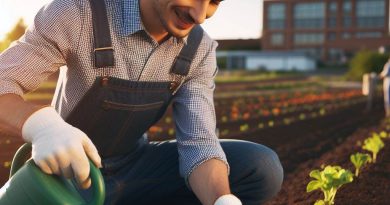Brexit Ongoing Impact on UK Farming
Last Updated on November 24, 2023
Introduction
Brexit, the UK’s decision to leave the European Union, has significant implications for UK farming.
Amidst the evolving landscape, the ripple effects touch not only the economic viability of farms but also the cultural and social fabric of rural communities.
Brexit’s influence extends to supply chains, affecting the availability of agricultural inputs and the accessibility of markets.
Furthermore, considerations of environmental sustainability and conservation gain prominence, as policies once intertwined with EU frameworks undergo recalibration.
This exploration seeks to unravel the nuanced layers of Brexit’s ongoing impact on UK farming, delving into the narratives of resilience, adaptation, and innovation emerging within the agricultural sector.
Beyond the immediate challenges, it reflects on the potential opportunities for growth, diversification, and international collaboration that may reshape the future trajectory of British agriculture.
As the dust of political change settles, the story of UK farming post-Brexit unfolds, marked by a tapestry of challenges, transformations, and the enduring spirit of those who cultivate the land.
Pre-Brexit landscape of UK farming
Importance of EU membership for UK agriculture
Being a member of the European Union offered significant advantages to UK farming.
Access to the EU single market allowed UK farmers to export their products easily.
Membership also provided a stable regulatory framework and access to funding for agricultural projects.
Common Agricultural Policy (CAP) and its impact on farming practices
The Common Agricultural Policy (CAP) played a crucial role in supporting UK farmers.
Farm subsidies, price supports, and measures to stabilize farm incomes were implemented through CAP.
This policy helped ensure the competitiveness and sustainability of UK agriculture.
It also encouraged environmentally friendly farming practices and rural development.
Trade relationships with EU member states
Prior to Brexit, the UK had strong trade relationships with EU member states.
As part of the EU, the UK benefited from tariff-free trade and low barriers for agricultural products.
Exports to the EU accounted for a significant portion of UK agricultural trade.
These trade relationships contributed to the overall prosperity of UK farming.
Labour availability and migration from EU countries
EU membership allowed the UK to access a large pool of skilled and unskilled agricultural workers.
Migration from EU countries provided the agricultural sector with a reliable supply of labor.
EU workers played a crucial role in harvesting crops, managing livestock, and performing other essential farm tasks.
Labour availability from EU countries was a key factor in supporting the productivity and profitability of UK farming.
In essence, the pre-Brexit landscape of UK farming was shaped by its EU membership.
The benefits of EU membership for UK agriculture included access to the EU single market, the support provided by the Common Agricultural Policy (CAP), strong trade relationships with EU member states, and a reliable supply of labor from EU countries.
These factors contributed to the prosperity and sustainability of UK farming.
However, with Brexit, the future of UK agriculture faces uncertainties and challenges which will be discussed in the following sections.
Read: Pesticide Regulations: Global Policy Shifts
Brexit’s impact on UK farming
Brexit has had a significant impact on UK farming, affecting various aspects of the industry.
Changes in agricultural subsidies and support
One of the major consequences of Brexit is the replacement of the Common Agricultural Policy (CAP) with domestic agricultural policies.
This shift will allow the UK to develop its own strategies for supporting and regulating the farming sector.
However, it also raises concerns about the availability and allocation of subsidies and funding, as well as the potential impact on infrastructure and environmental initiatives.
Altered trade arrangements and potential disruptions
Brexit has led to the need for new trade arrangements with the European Union (EU) and non-EU countries.
The introduction of tariffs and non-tariff barriers with EU countries has created obstacles for farmers who relied on smooth trade relationships.
Additionally, negotiations for new trade deals with non-EU countries present both opportunities and uncertainties for UK farmers.
Implications for agricultural products and markets
The changes brought about by Brexit have significant implications for the movement of agricultural products and their corresponding markets.
Farmers are experiencing shifts in export and import patterns, which may affect their profitability and market reach.
Moreover, the uncertainty surrounding future trade agreements may influence food prices and competition within the domestic market.
Challenges related to labor and workforce
Brexit has introduced challenges regarding labor and the workforce within the agricultural industry.
Restrictions on EU migrant workers have raised concerns about labor shortages, as these workers have played vital roles in farm operations.
To address this issue, the UK will need to invest in domestic workforce development and training programs to ensure a skilled and available workforce.
In general, the ongoing impact of Brexit on UK farming is multifaceted.
Changes in agricultural subsidies and support, trade arrangements, agricultural products and markets, as well as labor and workforce challenges, present both opportunities and uncertainties for the industry.
It is crucial for the UK to adapt and implement effective policies to mitigate any potential negative effects while capitalizing on new opportunities that arise from Brexit.
Read: Water Use Laws: Impact on US Farmers
Ongoing concerns and uncertainties
Future of EU farm subsidies for UK farmers
- The Brexit decision has raised concerns about the future availability of EU farm subsidies for UK farmers.
- As a member of the EU, UK farmers have benefited from Common Agricultural Policy subsidies, which provide significant financial support.
- The UK government has promised to maintain the current level of subsidies until 2022, but the long-term future remains uncertain.
- UK farmers are worried about potential reductions in funding and the impact it could have on their businesses.
Environmental and regulatory standards divergence
- Another concern is the divergence in environmental and regulatory standards between the UK and the EU.
- The EU has implemented strict regulations on issues such as pesticide use, animal welfare, and sustainability.
- If the UK chooses to lower its standards to secure new trade deals, it could lead to conflicts and difficulties in exporting to the EU market.
- UK farmers fear that lower standards could harm their reputation and make it harder to compete with EU producers.
Potential impacts on animal welfare and food safety
- Brexit raises questions about the potential impacts on animal welfare and food safety standards in the UK.
- The EU has established comprehensive regulations to ensure high standards in these areas.
- If the UK is no longer bound by EU regulations, there is a risk that animal welfare and food safety standards could be compromised.
- Consumers may also be concerned about the quality and safety of British agricultural products without the added assurance of EU standards.
Uncertainties in long-term market stability and access
- The future of the UK’s agricultural market stability and access to the EU market are major uncertainties.
- If a trade deal is not reached with the EU, UK farmers could face significant disruptions in their export markets.
- Tariffs and customs barriers could raise the cost of exporting agricultural products, making UK farmers less competitive.
- Farmers are also concerned about potential changes in consumer preferences and demand as a result of Brexit.
In a nutshell, Brexit’s ongoing impact on UK farming has caused numerous concerns and uncertainties among farmers.
The future availability of EU farm subsidies, potential divergence in environmental and regulatory standards, impacts on animal welfare and food safety, and uncertainties in long-term market stability and access all contribute to the challenges faced by UK farmers.
It is crucial for the UK government to address these concerns, provide clear long-term plans, and support the agricultural sector during this transition period.
Read: Tech in Agriculture: Regulatory Landscape

Steps taken by the UK government and farming industry
Agricultural policy reforms and initiatives
The UK government and farming industry have been implementing various agricultural policy reforms and initiatives.
These reforms aim to support and promote the growth and sustainability of the farming sector in the post-Brexit era.
One key aspect of these reforms is the shift towards a more environmentally friendly and sustainable farming system.
By encouraging practices such as crop rotation, soil conservation, and reduced pesticide use, the government aims to protect the environment while ensuring food security.
Furthermore, the government has introduced financial support schemes to help farmers transition to more sustainable farming practices.
These schemes provide financial incentives for farmers who adopt environmentally friendly practices, such as organic farming or agroforestry.
Investment in technology and innovation
Recognizing the importance of technological advancements in modern agriculture, the UK government has been investing in technology and innovation.
Through initiatives such as the Agricultural Productivity Taskforce, the government aims to improve productivity and efficiency in the farming sector.
This includes the development and adoption of advanced farming technologies, such as precision agriculture and robotics.
By embracing these technologies, farmers can increase yields, reduce costs, and minimize environmental impact.
Prioritizing trade deals and partnerships
In the wake of Brexit, the UK government has been prioritizing trade deals and partnerships to secure the future of the farming industry.
Trade agreements with countries outside the EU, such as the United States and Australia, have been actively pursued.
These agreements aim to expand market access for UK agricultural products and ensure a steady demand for British produce.
Furthermore, the government has been exploring new partnerships with emerging markets, with a focus on countries like China and India.
These partnerships provide opportunities for UK farmers to tap into growing markets and diversify their export options.
Collaboration with farming organizations and associations
The UK government recognizes the importance of collaboration with farming organizations and associations.
Through partnerships with these stakeholders, the government aims to address the challenges faced by the farming sector and develop effective solutions.
By working closely with industry experts, the government can ensure that policies and initiatives are tailored to the specific needs of farmers.
This collaboration also facilitates knowledge exchange, allowing for the sharing of best practices and innovative ideas.
Overall, the UK government’s efforts, coupled with the proactive involvement of the farming industry, have been instrumental in mitigating the impact of Brexit on UK farming.
Through agricultural policy reforms, investment in technology, prioritizing trade deals, and collaboration, the sector is adapting and positioning itself for a sustainable and prosperous future.
Read: Organic Farming Regs: What’s New in 2024?
Potential opportunities and challenges ahead
Embracing a more independent agriculture sector
- Brexit provides an opportunity for the UK farming industry to become more self-reliant.
- Reduced reliance on EU subsidies can lead to the development of innovative farming techniques.
- Investment in research and development can foster advancements in technology and sustainability.
- Brexit allows the UK to determine its own agricultural policies, tailored to its specific needs.
Development of niche markets and local production
- The UK can focus on niche agricultural products that cater to specific consumer demands.
- Increased emphasis on local production can reduce reliance on imported goods.
- Farmers can establish direct relationships with local consumers, promoting transparency and traceability.
- Expanding niche markets can create new opportunities for farmers to diversify their income streams.
Addressing long-standing issues in farming practices
- Brexit provides a chance to review and improve existing farming practices and regulations.
- Streamlining bureaucracy can reduce administrative burdens on farmers, improving efficiency.
- Environmental initiatives can be developed to enhance conservation and biodiversity on farms.
- Animal welfare standards can be enhanced, aligning with consumer preferences and ethical considerations.
Minimizing negative impacts while optimizing benefits
- The government needs to ensure a smooth transition to avoid disruptions in the farming industry.
- Developing trade agreements that prioritize the needs of UK farmers is crucial.
- Supporting farmers through financial assistance schemes can offset potential losses during the transition.
- Collaboration and cooperation between the government, farming organizations, and farmers are essential for success.
In summary, Brexit presents both opportunities and challenges for the UK farming industry.
Embracing a more independent agriculture sector, developing niche markets, addressing long-standing issues, and minimizing negative impacts are key strategies to navigate the post-Brexit landscape.
It is crucial for the government and industry stakeholders to work together in order to maximize the benefits and ensure a sustainable future for UK farming.
Conclusion
After examining the ongoing impact of Brexit on UK farming, it is clear that the sector is facing numerous
challenges and uncertainties. From changes in trade agreements to the potential loss of EU subsidies,
farmers are having to adapt to a new and unpredictable landscape.
Brexit poses significant risks and opportunities for UK farming.
It is crucial for farmers to stay informed about the latest developments and actively adapt their strategies to navigate the changing environment.


